|
|
|
Sort Order |
|
|
|
Items / Page
|
|
|
|
|
|
|
| Srl | Item |
| 1 |
ID:
138438


|
|
|
|
|
| Summary/Abstract |
As Army chief of staff, secretary of state, and secretary of defense, George C. Marshall played a major role in creating, implementing, and defending the multilateral “Europe-First” global strategy that guided U.S. foreign and military policies through World War II and the Cold War. This lecture explores how and why he did so, emphasizing the decision to defeat Germany before Japan, the postwar European Recovery Program that bears Marshall’s name, and the relief of General Douglas MacArthur during the Korean War for his refusal to accept this grand strategy. In the process it analyzes the complex relationship that exists between diplomatic and military history.
|
|
|
|
|
|
|
|
|
|
|
|
|
|
|
|
| 2 |
ID:
101063
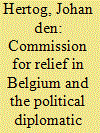

|
|
|
|
|
| Publication |
2010.
|
| Summary/Abstract |
During the First World War, the Commission for Relief in Belgium (CRB) supplied occupied Belgium with food, provoking discord between military and political leaders on both sides. The CRB's work undermined the Allies' economic blockade of the enemy, attracting military criticism. In Germany, politicians favoured sustaining the food supply to prevent unrest, whilst the Army wanted to exploit Belgium's resources. From 1916 onwards, the CRB became a bone of contention in Germany in the dispute between military and political leaders about unrestricted submarine warfare. It also loomed large in the political and military debate about the attitude to neutral countries: the Allies wanted them to brave the German threat and cooperate with the blockade policy-otherwise, food imports from Allied countries would be forbidden. Tonnage and food for the CRB were incorporated into the negotiations with neutral countries about their imports and the use of home-grown produce. The debates about the CRB thus exemplify the relationship between military events and the war's economic and social significance. This study of the CRB shows that political/diplomatic historiography can bridge the gap between the military and socioeconomic history of the First World War.
View Full Text Article
|
|
|
|
|
|
|
|
|
|
|
|
|
|
|
|
| 3 |
ID:
157083
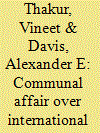

|
|
|
|
|
| Summary/Abstract |
This paper makes an archival journey into the making of institutes of international affairs in late colonial India. By exploring the intertwined lives of two such institutions, it unearths an ideational fight over the study of international affairs in India between the Indian Institute of International Affairs (IIIA), established in 1936, and the Indian Council of World Affairs (ICWA), started in 1943. From the outset, the IIIA was strongly pro-government and saw the ICWA as an institutional rival and a propaganda front for the Indian National Congress (INC). Closer to Independence, the two institutes were increasingly divided along communal and nationalist political lines. The IIIA's leadership became dominated by Muslims and the Muslim League and the ICWA by Brahman Hindus and the INC. As a result, a battle for legitimacy and recognition ensued over participation in international conferences and the ability to publish meaningful research. The ICWA successfully organised the Asian Relations Conference in March 1947, which sealed the fate of the IIIA. It moved to Pakistan in the wake of Partition, then quietly closed down after co-existing briefly with the Pakistan Institute of International Affairs (PIIA).
|
|
|
|
|
|
|
|
|
|
|
|
|
|
|
|
| 4 |
ID:
175072
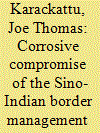

|
|
|
|
|
| Summary/Abstract |
India and China have entered a new low in their bilateral relations. Having fought a war in 1962, it took over three decades for both countries to achieve normalcy at the borders, aided by a series of border management agreements and protocols to maintain tranquility along the border areas. However, the June 2020 Galwan clashes have changed that permanently. This paper argues that the current escalation of border clashes is both a symptom and consequence of the breakdown of the bilateral border management framework which has been dented since the 2017 Doklam standoff between both countries. Delving into diplomatic history relating to Doklam and Galwan, the findings point to the need to correct the epistemic criteria used to reproduce claims of an unambiguous boundary between India and China by both countries, in order to ensure abatement of similar outcomes.
|
|
|
|
|
|
|
|
|
|
|
|
|
|
|
|
| 5 |
ID:
090662
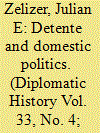

|
|
|
|
|
| Publication |
2009.
|
| Summary/Abstract |
During the first half of the 1970s, Presidents Richard Nixon and Gerald Ford responded to the aftermath of Vietnam by avoiding the extremes of the era: massive military retrenchment (left) and massive military escalation (right). The presidents had different reasons for seeking a centrist national security agenda. The Republican presidents were willing to accept and actively pursue arms and trade agreements with the Soviet Union and China. Nixon concluded that appealing to moderates was essential in order to protect a muscular national security state from retrenchment in the aftermath of the 1960s and to ensure his own electoral success. His successor, Gerald Ford, believed that détente with the Soviets could rebuild public confidence in the post-Watergate GOP.
|
|
|
|
|
|
|
|
|
|
|
|
|
|
|
|
| 6 |
ID:
083983
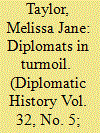

|
|
|
| 7 |
ID:
164918
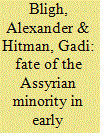

|
|
|
|
|
| Summary/Abstract |
Analyzing ethno-national conflicts is usually not easy in that not all quantitative scientific tools are useful to the student of a conflict based on primordial elements. The burden of studying the outcome of a conflict is all the more complex given that the two conflicting groups might be at two different stages of their political development at any given time during the course of the conflict. In the case of the fate of the [Eastern Christian] Assyrian community in early independent Iraq, the political rationale for decisions taken by each party was drawn from different sociological, historical and political realms. Decisions in times of conflict and their political and historical ramifications are not always rational, since they draw upon primordial/communal considerations rather than the accurate reading of the overall true strategic scene.
|
|
|
|
|
|
|
|
|
|
|
|
|
|
|
|
| 8 |
ID:
141960
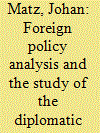

|
|
|
|
|
| Summary/Abstract |
In 1982, claims were made that the Swedish diplomat, Raoul Wallenberg, when preparing in mid-January 1945 for his trip to Soviet military headquarter in Debrecen, north of Budapest, concealed large amounts of valuables—gold and jewellery—in his car. Moreover, the argument exists that Russian discovery of these valuables had a significant impact on both Swedish and Soviet handling of his case. Recently re-surfacing in a biography of Wallenberg, this claim is incorrect. The testimonies referred to in its support are fraught with serious weaknesses and, the causal chain allegedly set off about finding the valuables is not verifiable. This analysis argues that the study of the diplomatic history of the Wallenberg case could benefit significantly by taking some basic insights from the field of foreign policy analysis into account.
|
|
|
|
|
|
|
|
|
|
|
|
|
|
|
|
| 9 |
ID:
083980
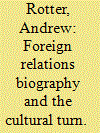

|
|
|
| 10 |
ID:
176161
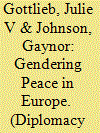

|
|
|
|
|
| Summary/Abstract |
This introduction tracks how international and diplomatic history have, gradually, been gendered, as well as tracing the evolving interest in the role of women in peace movements. Most articles in this special issues developed from contributions to the ‘Gendering Peace in Europe’ conference held at the University of Sheffield in January, 2017, and here we consider the ways in which the category of gender can be more firmly embedded into research in the field of diplomacy and statecraft.
|
|
|
|
|
|
|
|
|
|
|
|
|
|
|
|
| 11 |
ID:
066108
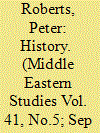

|
|
|
| 12 |
ID:
141036
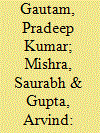

|
|
|
|
|
| Edition |
1st ed.
|
| Publication |
New Delhi, Pentagon Press, 2015.
|
| Description |
xx, 124p.hbk
|
| Contents |
Vol. I
|
| Standard Number |
9788182748491
|
|
|
|
|
|
|
|
|
|
|
|
Copies: C:2/I:0,R:0,Q:0
Circulation
| Accession# | Call# | Current Location | Status | Policy | Location |
| 058310 | 372.890954/GAU 058310 | Main | On Shelf | General | |
| 058311 | 372.890954/GAU 058311 | Main | On Shelf | General | |
|
|
|
|
| 13 |
ID:
090661
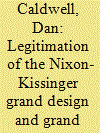

|
|
|
|
|
| Publication |
2009.
|
| Summary/Abstract |
This article focuses on the attempt of President Richard M. Nixon and Dr. Kissinger to gain domestic acceptance of the grand design and grand strategy they developed for American foreign policy during the period they were in office, with particular emphasis on the concept of policy legitimation. This article draws on extensive secondary accounts, memoirs, archival materials, and the author's interviews and own previously published, related work.
|
|
|
|
|
|
|
|
|
|
|
|
|
|
|
|
| 14 |
ID:
142072
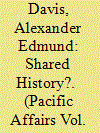

|
|
|
|
|
| Summary/Abstract |
This article challenges the validity of recent suggestions that “shared history” underpins India-Australia relations through an historical analysis of little-known diplomats who worked for the Indian High Commission in Australia and the Australian High Commission in India immediately after Indian independence. Based on largely unexplored archival material from India, Australia and Canada, it argues that Australia’s racialized identity, as expressed through the “White Australia” policy, thoroughly shaped Indian perceptions of Australia. While Indian policy-makers never officially voiced their distaste for White Australia, Indian diplomats put their efforts into reshaping the image of India in Australia through travel and issue_image_88_4_Educating the Other_Modi at Australia War Memorial_Davispersonal contacts as part of an effort to educate Australia about India. Likewise, Australia’s colonial identity led it to see India and Indian foreign policy as “irrational” due to its emphasis on racial discrimination and decolonization. It is argued that, far from underpinning the relationship, colonial histories and subsequent postcolonial identities have played an important role in fracturing India-Australia relations.
|
|
|
|
|
|
|
|
|
|
|
|
|
|
|
|
| 15 |
ID:
126710
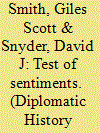

|
|
|
|
|
| Publication |
2013.
|
| Summary/Abstract |
For the best part of three decades, from 1946 until 1977, civil aviation played a central role in Dutch-American diplomatic relations, consistently causing major friction at the highest levels of both the government and the business sector on both sides of the Atlantic. Yet up till now this remarkable episode in the relations between two close transatlantic allies has remained under-researched and neglected by traditional diplomatic historians unable to grasp its full significance. The dispute centered on the ostensibly anodyne wish of the Dutch national airline, KLM, to expand its access to airports in the United States. Yet the "landing rights question" exposed more than ever the uneven power relations, clashing national interests, and antagonistic perceptions that lay behind the otherwise friendly relations between Washington and The Hague. The article examines the causes and consequences of these tensions through four intense periods of negotiations in the 1940s, 1950s, 1960s, and 1970s, each case involving a set of actors, interests, and strategies. On the U.S. side, the divergence between diplomatic and commercial interests lay at the heart of a hard-nosed civil aviation policy that was not prepared to give the Dutch what they wanted. Meanwhile for the Dutch, KLM represented the epitome of national pride and pioneering enterprise, and U.S. intransigence on the landing rights issue was regarded as hypocritical and a direct threat to the continuing vitality of the airline itself. Looking to overcome this asymmetric deficit, the Dutch employed various strategies-public diplomacy, the contacts of elite networks, the "rights" of a close ally-to secure results. Coming from the perspective of "New Diplomatic History," the article maintains that traditional state-centered historiography tends to miss the deeper terrain on which bilateral and multilateral relations among the western allies were conducted. As a result, it provides a behind-the-scenes view of alliance politics from a unique angle during the Cold War.
|
|
|
|
|
|
|
|
|
|
|
|
|
|
|
|
| 16 |
ID:
174800
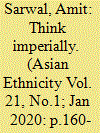

|
|
|
|
|
| Summary/Abstract |
Academic research on the White Australia Policy has spanned the history of Asian migration and policy-making initiatives in Australia. However, the role of popular transnational media images and stories of the past that inform the socio-cultural understanding of Australia–India cross-cultural relations has been under evaluated. In this paper, using unexplored archival material from popular newspaper reports and columns, I will examine the ‘goodwill visits’ of two Indian journalists, K. K. Lalkaka and Sir R. Srinivasa Sarma, to Australia in 1927 and 1947. By assessing the role of these two journalists, this paper will highlight transnational issues such as migration, ethnicity, race, class and trade between the two countries. Borrowing from Vineet Thakur’s research highlighting the role of first diplomats in the pre-independence era India, this article will contribute to the field of history in Indian diplomatic studies and historiography of Australian–Indian cross-cultural relations.
|
|
|
|
|
|
|
|
|
|
|
|
|
|
|
|
| 17 |
ID:
154642
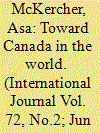

|
|
|
|
|
| Summary/Abstract |
As a field of study, Canadian Foreign Policy history has been on life support for the better part of three decades. While its resiliency speaks to the commitment of its practitioners, the fact that Canadian international history has largely been sidelined is troubling given both the field’s importance generally and its appeal to undergraduate students and the wider public. Yet, at the same time as Canadian Foreign Policy history has been in stasis, a new field examining Canadian interactions with the world through transnational and cultural lenses has arisen. As the apocryphal Chinese proverb puts it, this situation presents both danger and opportunity for Canadian international history. In this article I explore how Canadian international historians might seize the initiative by crafting a new, expansive field of study—Canada in the World—which preserves the study of Canadian Foreign Policy while incorporating other analytical approaches.
|
|
|
|
|
|
|
|
|
|
|
|
|
|
|
|
| 18 |
ID:
074725
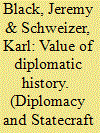

|
|
|
| 19 |
ID:
188613
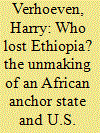

|
|
|
|
|
| Summary/Abstract |
In November 2020, Ethiopia descended into full-scale civil war which, owing to mass atrocities and regional intervention, metastasized into among the most acute humanitarian emergencies in the world. The violent fragmentation of state authority tarnished Ethiopia’s internationally sanctioned role as regional peacekeeper and developmental leader—an “anchor state” of the Pax Americana in the Horn of Africa. While acknowledging the complex, multi-dimensional origins of the conflict, this article examines how efforts by the U.S. government to reinvent the strategic relationship during the 2018–2020 political transition in Addis Ababa helped pave the road to war. We argue that U.S. policymakers provided largely unconditional support to Ethiopia’s new Prime Minister Abiy Ahmed, creating problems of moral hazard that encouraged confrontation between rival political forces. The story of U.S. engagement in Ethiopia in this period illustrates the perils of Washington’s efforts to rebalance fraught relations with its most important regional anchors.
|
|
|
|
|
|
|
|
|
|
|
|
|
|
|
|
| 20 |
ID:
132923
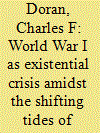

|
|
|
|
|
| Publication |
2014.
|
| Summary/Abstract |
Today, as throughout history, a 'single dynamic' of structural change is shaping the power cycles of all of the great powers - and the expectations that each state has about its future security and foreign policy role.1 Across the six centuries of the emerging modern state system, states have competed for relative power share, attempted to advance foreign policy roles, and struggled against the 'bounds of the system' (finiteness of share) that limits and contours each state's cycle of relative power and its possibilities for role gratification. Projections of future power, role and security are embedded at each historical point on the coevolving power cycles, reflecting the emergent 'trends of history' and 'shifting balance of world forces' experienced by statesmen and assessed in economic and diplomatic history. Implicit in the expression 'peaceful rise' that permeates discussion of the rise of China today is the coded question: Will the world this century repeat the mistakes of the early twentieth century, mistakes that fueled the spiral into World War I (WWI)? For founders of the field of international relations (IR) and world statesmen
negotiating international regimes, witnesses to that catastrophe, the quintessential problem confronting statecraft was how to integrate an increasingly powerful great state into the existing global balance of power and community of nations itself experiencing the challenges and uncertainties of structural change - the so-called dilemma of peaceful change.
|
|
|
|
|
|
|
|
|
|
|
|
|
|
|
|
|
|
|
|
|